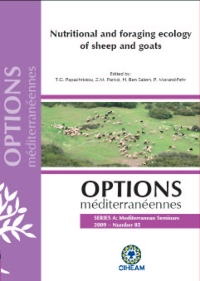| Article précédent | p. 255-260 | Article suivant |
Investigation of potential new opportunities for plant extracts on rumen microbial fermentation in vitro
The fermentation characteristics of adding different levels (0, 0.5, 1.0 and 1.5 ml/75 ml buffered rumen fluid) of plant extracts to a basal substrate (50% roughage:50% concentrate) were evaluated in vitro by a semi automatic gas production (GP) technique. The investigated plant extracts were thyme (Thymes capitus - T0.5, T1.0, T1.5), fennel (Foenicum vulgary - F0.5, F1.0, F1.5), ginger (Zingiber officinale - G0.5, G1.0, G1.5) and black seed (Nigila sativa - BS0.5, BS1.0, BS1.5). The plant extracts linearly increased GP by 11.7 and 59.7% for T1.5 and BS1.0, respectively except G1.5 and BS1.5 which the GP decreased by 4.6 and 22.5%, respectively. All the plant extracts increased the methane concentration from 53 to 166% except BS1.5 that decreased methane by 64.1%. Efficiency of microbial protein production was estimated in vitro by the partitioning factor (PF). All the extracts, except BS1.5, decreased the PF value. Although inclusion of thyme extract increased the GP, it decreased significantly the dry and organic matter degradation (DMD and OMD). On the other hand, the F1.5 improved significantly (P < 0.05) DMD and OMD. The black seed and fennel extract significantly decreased the NH3-N concentration, while T0.5, T1.0, G1.0 and G1.5 increased it. The G0.5, BS1.5, G1.0, and G1.5 extracts decreased the protozoa number by 25.4, 25.4, 30.5 and 37.3%, respectively, while the thyme and fennel extract increased the protozoa number. This study suggested that the plant extracts have the potential to affect fermentation efficiency, and black seed extract could be a promising methane mitigating agent.
Les caractéristiques de fermentation des extraits végétaux apportés à des doses croissantes (0, 0,5, 1,0 et 1,5 ml/75 ml de jus de rumen tamponné) à un substrat de base (50% fourrage:50% concentré) ont été évaluées in vitro par la technique semi-automatique de production du gaz (PG). Les extraits végétaux étudiés ont été : thym (Thymes capitus - T0,5, T1,0, T1,5), fenouil (Foenicum vulgare - F0,5, F1,0, F1,5), gingembre (Zingiber officinale - G0,5, G1,0, G1,5) et la graine noire (Nigila sativa - GN0,5, GN1,0, GN1,5). Les extraits végétaux ont augmenté linéairement la PG de 11,7 et 59,7% pour le T1,5 et le GN1,0, respectivement, à l'exception du G1,5 et GN1,5 qui diminuaient la PG de 4,6 et 22,5%, respectivement. Tous les extraits végétaux étudiés ont augmenté la production de méthane de 53 à 166% à l'exception du GN1,5 qui l'a diminué de 64,1%. L'efficacité de la production de protéine microbienne in vitro a été estimée par le facteur de division (FD). Tous les extraits, sauf le GN1,5, ont diminué le FD. Bien que l'ajout de l'extrait de thym ait augmenté la PG, elle a diminué significativement la dégradation de la matière sèche et de la matière organique (DMS et DMO). D'autre part, le F1,5 a amélioré significativement la DMS et DMO. Les extraits de la graine noire et du fenouil ont diminué significativement la concentration de NH3-N, tandis que T0,5, T1,0, G1,0, et G1,5 l'ont augmenté significativement. Les extraits G0,5, GN1,5, G1,0, et G1,5 ont diminué le nombre de protozoaires de 25,4, 25,4, 30,5 et 37,3%, respectivement, tandis que ceux du thym et de fenouil l'ont augmenté. Cette étude suggère que les extraits végétaux peuvent affecter l'efficacité de la fermentation. L'extrait de graine noire, surtout, pourrait être un agent prometteur de l'atténuation de méthane.
- [ Afficher ]
- [ Télécharger ]
- [ Exporter la citation ]
Vous pouvez télécharger la citation au format :
- [ Imprimer ]
-
Mots-clés
DIGESTION DU RUMEN, EXPERIMENTATION IN VITRO, EXTRAIT D'ORIGINE VEGETALE, FERMENTATION, FOENICULUM VULGARE, THYM, ZINGIBER OFFICINALECiter cet article
Sallam S.M.A., Bueno I.C.S., Brigide P., Godoy P.B., Vitti D.M.S.S., Abdalla A.L. Investigation of potential new opportunities for plant extracts on rumen microbial fermentation in vitro. In : Papachristou T.G. (ed.), Parissi Z.M. (ed.), Ben Salem H. (ed.), Morand-Fehr P. (ed.). Nutritional and foraging ecology of sheep and goats. Zaragoza : CIHEAM / FAO / NAGREF, 2009. p. 255-260. (Options Méditerranéennes : Série A. Séminaires Méditerranéens; n. 85). 12. Seminar on: Nutritional and Foraging Ecology of Sheep and Goats, 2007/10/11-13, Thessaloniki (Greece). http://om.ciheam.org/om/pdf/a85/00801014.pdf



